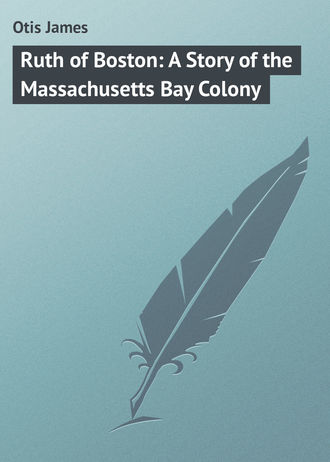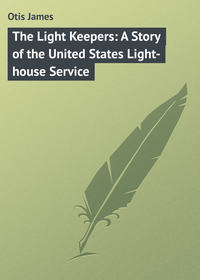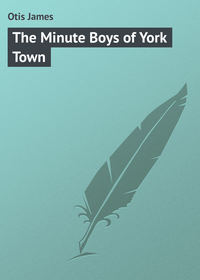 полная версия
полная версияRuth of Boston: A Story of the Massachusetts Bay Colony
It was near to night before we were done with giving thanks, and then at each home was held a feast.
During Governor Winthrop's lecture on this thanksgiving day, he urged that all the people, children as well as grown folks, should take this time of famine as a lesson, reminding us that it would not be a long while before we could hope to reap a harvest, and in the meantime there was very much of labor to be performed.
He declared that even with the cargo of the Lyon, we had not enough to satisfy our wants until crops could be gathered; but it was certain other ships would come to Boston during the summer, with more stores. Yet because of its being possible we might come to a time of suffering again, so must we be careful that not the smallest grain of wheat be wasted.
A DEFENSE FOR THE TOWN
When the spring had come, and before it was time to put seed into the ground, our fathers set about building a defense for the town.
If you remember, I have already set down that this new village of ours was on a point, connected with the main coast only by a very narrow strip of land. Now to defend our town from an attack by enemies, save they should come by water, it was only necessary the defence be built on this narrow neck, or strip, and so it was built.
From one side to the other, extending even down into the water, was a palisade, or fence, of heavy logs, in the middle of which stood a gate to give entrance, and the law was that it should be shut at sunset, not to be opened again until day had dawned.
THE PROBLEM OF SERVANTS
Since coming here we have seen so many Indians as to become acquainted with them, which is to say, that we no longer look upon them as savages, and have no fear to stand in the road when they pass. But those whom Susan and I had seen, up to the day when Chickatabut, the chief man of the Massachusetts tribe, came, were only common people, and such servants as are employed here in the town, for you must know that more than one family has a Narragansett Indian, or, mayhap, a Nipmuck, to work in the house.
Mother says that she would rather do all the work of the house alone, than have one of the brown women to help her, for they are not cleanly to look upon, but as for myself, I think I could stand the sight of one of them, especially when it comes to soap making, of which I will tell you later.
Of course there are times when housewives must have some one to aid them, and those girls or women among us who would go out to work in the house are not many in numbers, therefore one must put up with the Indians, which is unpleasant, or take those who are known as indentured servants, meaning the people who have agreed with the Massachusetts Bay Company to work for so many years, in order to pay for their passage over from England.
As for these last people, mother will not have them in the house, because of being afraid that we may not get one of good morals. Therefore in our home mother and I do all that is needed, rather than have around us people of whom we know nothing.
CHICKATABUT
It was not regarding the Indians, or free willers, as indentured servants are called, that I intended to write when I began. That which I counted to say was, that when the spring had come, after the arrival of the Lyon, and we were free for the time being from fears of a famine, the Indian by the name of Chickatabut came to see Governor Winthrop, having been invited to the end that he might sell us, who are here in Boston, this piece of land on which we are building our town.
You must know that he is quite the most important savage roundabout here, and father believes, as does Governor Winthrop, that if he sells us the land, it will be a lawful bargain, because of his standing, as I have said, at the head of all these brown people nearabout.
Now it so chanced that he was the first savage of note I had seen, and really he was something grand to look upon. He had feathers on his head, like unto a crown, and from this drooped a long trail of feathers reaching to the ground, while his leggings and doublet of tanned deer skin were covered with beads, worked in fanciful patterns, together with the claws of beasts. His arrows were carried across his back, in a covering embroidered with the quills of the porcupine painted in various colors, and he held his bow in his hand.
I cannot set down as I would, exactly how he was dressed, because, having come upon him suddenly while on my way to Susan's house, of being startled by so much of adornment that I was like to have run away.
He came, as I have said, to visit Governor Winthrop, and father declares that he sat at the table as a white man would have done, save that instead of using the knife and spoon, he took up food with his fingers. Mother thinks that the Governor must have been relieved indeed when his guest departed, for no one insists so strictly upon proper table manners as does Master Winthrop.
It must have been that Chickatabut was pleased with his visit, for two or three days after having gone back to his people, he sent the Governor as much Indian corn as would fill a hogshead, and, in return for the gift, Master Winthrop presented him with a suit of clothing made in English fashion by a tailor.
Father says that now indeed do we own all the land this side of the neck, for Master Blackstone, who had a farm here, as I have already said, sold it to our people before we moved over from Charlestown, and now with Chickatabut's selling of the same, there should be no question as to who has a lawful claim upon it.
BUILDING A SHIP
Although, in my own mind, there was never any doubt but that the land was rightfully ours without consulting a savage about it, yet I believe, from all I heard said, that our people felt better in mind after this Indian chief had agreed to our staying here, for it seemed as if he had no sooner made the bargain than work was pushed forward more as it would have been done in England.
As for instance, Governor Winthrop began building a vessel, and now, if you please, we are to have a ship of our own, made in Boston, launched in Boston, and to sail from Boston.
When she is finished, and has sailed to Southampton or Liverpool, the people there must begin to believe that we of the Massachusetts Bay Colony are getting well on in the world if we can own fleets, for in case one vessel can be built, there is no reason why we should not have many, while there is so much of lumber everywhere around.
HOUSEHOLD CONVENIENCES
Do you know what a betty-lamp is? We have two in our house, which were brought over by Captain Pierce of the Lyon, as a gift to my mother.
You, who have more or less trouble with your rush lights, cannot fancy how luxurious it is to have one of these betty-lamps, which costs in care no more than is required to fill them with grease or oil.
Fearing lest you may not know what these lamps are, which Susan's mother says should be called brown-bettys, I will do my best to set down here such a description as shall bring them before you.
The two which we have are made of brass; but Captain Pierce says they are also to be found of pewter or of iron.
These are round, and very much the same shape as half an apple, save that they have a nose an inch or two long, which sticks out from one side. The body of the bowl is filled with tallow or grease, and the wick, or a piece of twisted cloth, is threaded into the nose, with one end hanging out to be lighted.
Ours hang by chains from the ceiling, and the light which they give is certainly equal to, if not stronger than, that of a wax candle; but they are not so cleanly, because if the wick be ever so little too long, the lamps send forth a great smoke.
Father says he has seen a phœbe-lamp, which is much like our betty-lamps, save that it has a small cup underneath the nose to catch the dripping grease, and that I think would be a great improvement, if indeed it is possible to improve upon so useful an article of household furniture as this.
Speaking of our betty-lamps reminds me that Susan's mother had sent over to her in the Lyon, a set of cob irons, which are something after the fashion of andirons, or fire-dogs, save that they are also intended to hold the spit and the dripping pan. She had also a pair of "creepers," which are small andirons, and which she sometimes used with the cob irons.
The andirons which we brought from England are much too fine to be used in this fireplace, which is filled with pothooks, trammels, hakes, and other cooking utensils.
They were a wedding present to my mother, and are in what we call "sets of three," meaning that on each side of the fireplace are three andirons; one to hold the heavy logs that are at the bottom of the fire; another raised still higher to bear the weight of the smaller sticks, and a third for much the same purpose as the second; or, perhaps, to make up more of an ornament, for they are of iron and brass, and are exceeding beautiful to look upon.
I have used the words trammels and hakes, but it is possible that you may not know their meaning, and so I will add by way of explanation that though they are both hooks upon which we may hang pots and kettles, the trammel is so constructed that it may be lengthened or shortened, being made of two parts.
HOW THE WORK IS DIVIDED
There is no good reason why I should make any attempt at setting down here all that was done by our people in the way of planting, in order that we might have such a harvest in the fall as would put far from us the fear of another famine.
It should be easy for you to fancy how we are employed here in this new town. Some of the men are working at the palisade, or barricade on the Neck; others are in the field planting and hoeing, while yet another company is in the shipyard on the Mystic River.
Ten or twelve of the people are constantly fishing, or hunting, to add to the food supply, while those servingmen or laborers who are not skilled at other work are cutting trees into fuel, and otherwise clearing the land that it may be tilled another year.
The women and children are no less busy, and it is easy for you to guess what their duties are. These log houses, while not requiring as much care as if they were mansions, need very much in the way of woman's work.
Lest the shiftless ones, who have no pride in the appearance of the town, or are too lazy to do other than what may be absolutely necessary, should allow the dirt to gather round about the outside of the houses, a law has been made obliging each person to keep free from dirt or filth of any kind, all the land surrounding his dwelling for a distance of fifty paces, whether in the street or garden, and it is upon us children that this last work falls.
Save for the babies, and those who are abed with sickness, there are no idle ones in Boston, and well indeed it should be so, for it surely is true that "Satan finds some mischief still for idle hands to do." If we were not busily engaged during all the waking hours, then would we have opportunity to grow homesick, for much as we are growing to like this New World, there will come now and then thoughts of the homes we left in England, and one's heart falls sad at realizing that, perhaps, never again will we see those whom we left behind when the Arabella sailed out of Southampton.
LAUNCHING THE SHIP
It is not well that I let my mind go back into the past. I should think only of the future, and of what we are doing here in Boston, the most important of which just now is the launching of our ship.
She is what sailors call "bark rigged," which is the same as saying that she has three masts; but yet not as much of rigging as a ship.
Her name, painted on the stern, is Blessing of the Bay, and there is hardly any need for me to say that every man, woman, and child in the town stood near at hand to see her as she slipped down the well greased ways into the river, where she rode as gracefully as a swan.
I have already said that when the Lyon came in, at the time of the famine, she appeared the most beautiful vessel I had ever seen, and next to her comes the Blessing of the Bay. As Governor Winthrop said in the short lecture he gave us before launching, she was Boston made, of Boston timber, and would be sailed by Boston sailors, so that when she goes out across the ocean, people shall know that there are Englishmen far overseas who are striving, with God's help, to make a country which shall one day stand equal with the England we have left forever.
It is while speaking of the launching that I am reminded of a very comical mishap to Master Winthrop, and I may set it down without disrespect to him, for he is pleased to join in the mirth whenever it is spoken of as something to cause laughter.
MASTER WINTHROP'S MISHAP
It seems that the wolves had been worrying some of the goats that Master Winthrop brought over to this country with him, and on a certain day, after supper, he went out with his gun in the hope of killing a few of the ravenous beasts.
He had not traveled more than half a mile from home when night came on, and, turning about to go back, as was prudent, for it is not safe that one man shall be alone in the forest after dark, because of the wild animals, he mistook his path, wandering directly away from the river, instead of toward it.
I myself have heard him say that he must have walked a full hour, and was growing exceeding uncomfortable in mind, when he came to an Indian hut that was built of branches of trees and of skins, so that it formed a fairly comfortable dwelling, and was of sufficient strength to resist the efforts of any one to enter, save through the door.
There was no person inside this hut or wigwam; the door was unfastened, and the Governor, understanding that he must have some shelter during the night, else was he in danger of being devoured by wild beasts, entered as if it were his own dwelling.
With his flint and steel he built a fire, and by its light, saw, piled up in one corner of the place, mats such as the savages use to sleep upon. Having taken a mouthful of snakeweed, which is said to be of great benefit in quieting one's nerves, and prayed to God for safe keeping during the night, he lay down.
Before much time had passed, and certainly while his eyes were yet wide open, it began to rain, and some of the water finding its way through the carelessly thatched roof, disturbed his rest, so that it was impossible to sleep.
He spent the night singing psalms, gathering such wood as he could handily come at from the outside, to keep the fire going, and pacing to and fro in the narrow space, until near to daylight, when an Indian squaw came that way.
The Governor, hearing her voice as she cried out to whosoever owned the hut and was evidently a friend of hers, barred the door as best he might, while she stood on the outside beating it with her hands, and calling aloud in the Indian language, first in friendly terms, and then angrily; but yet he made no reply.
The door held firm against her efforts until day came, when the Governor walked out of the hut, not dreaming the woman would make an attack upon him, but straightway he was forced to take to his heels, or, as he laughingly declared, she would have clawed out his eyes.
Although we children knew nothing whatsoever concerning it, the chief men of the town had been greatly alarmed because of the Governor's disappearance, and during the whole of the night no less than twenty had walked to and fro in the forest hunting for him; but by an unkind chance never going in the direction of this hut. When Master Winthrop made his appearance, it had just been decided that a hue and cry should be raised, and all the men in Boston be called to aid in the search.
NEW ARRIVALS
It was during this summer, when Captain Pierce brought the Lyon to us for the third time, that Mistress Winthrop, the Governor's wife came over.
John Eliot, the preacher, was also one of the passengers, and they had even a longer voyage than had we in the Arabella.
The Lyon left Southampton about the middle of August, and did not arrive here until the fourth of November, when she came to anchor off Nantasket.
Then indeed did we have a week of rejoicing, sharing in the Governor's gladness that his family was with him once more. All those who could get boats to convey them, went down off Nantasket, and when Mistress Winthrop stepped ashore at the foot of our cove, she was honored by volleys from all the firearms in the town.
During three days that followed, it was as if the people believed Master Winthrop and his loved ones were in danger of starvation, for, from the highest to the lowest in the town, each brought some gift of food, such as fat hogs, goats, deer meat, geese, partridges, – in fact, anything that could be eaten, save clams, fish, and lobsters, of which we had already more than plenty enough to dull one's appetite for such eating.
Those who read what I have here set down, may charge me with speaking overly much concerning what we had to eat, and yet I question whether any of our company who passed through the famine of the year of 1630, and the pinching times of 1631 and 1632, could do otherwise than dwell upon our store of food.
ANOTHER FAMINE
Now, if you please, I will set down at once that which is in my mind concerning it, so that I need not weary you by repeating. This first year of harvest was a fairly plentiful one, and would have sufficed for all our wants during the coming winter, had it not been that other people were joining us by every ship, nearly all of whom were poorly provided for, having left England in the belief that we were dwelling amid plenty.
Therefore it was, that to feed these new comers as well as ourselves, we were frequently hard pressed for what was actually needed to save ourselves the pangs of hunger.
It is true that during this summer of 1631 many cattle were sent from England; but so many died during the voyage, that those which lived seemed extremely precious, because from them were we counting on our future herds. People who had spent their money in England buying twenty cows, but succeeded in bringing to Boston only four, could not afford to kill them for the sake of meat, more especially since the very life of our colony depended upon their increase.
We had famine in the first year; we were cramped for food during the second year, yet consoled ourselves with the thought that when another season had come, there would be so much seed put into the ground that there could be no question of lack of whatever might be needed.
But the summer of our third year in Boston was cold and wet; the crop of corn failed almost entirely, and again were we forced to seek our food from the sea, or to dig for clams; but even this last was extremely difficult, owing to the exceedingly cold winter of that season.
The Charles river was frozen from shore to shore, and it was as if the snow fell almost every day, until the drifts were piled so high roundabout our town that, save in the very center of the village, we could not move about.
Another famine was staring us in the face when the winter came to an end, and we knew that unless help should reach us from the outside, we could not add to our stores until another harvest time.
Then it was that we realized the value of having neighbors, and truly these were neighbors indeed, who, at Jamestown in the New World, had such store of food, as would allow them to lade a ship wholly with corn, sending her, through God's direction, to that port where the supply was most needed.
Lest I weary you with too many words regarding our hunger, I will set it down thus briefly, that, except at rare intervals, we were pinched for food during the first five years we lived in Boston, and not until that time had passed were we free from further fear of famine.
FINE CLOTHING FORBIDDEN
And yet we did not spend all our time complaining one to another lest on the morrow we should be hungry, and in proof of this I am minded to set down here that which I have copied from the law made in our town four years after we came across from Charlestown:
"That no person, either man or woman, shall hereafter make or buy any apparel, either woolen, or silk, or linen with any lace on it, silver, gold, or thread, under the penalty of forfeiture of said cloths. Also that no person, either man or woman, shall make or buy any slashed cloths, other than one slash in each sleeve, and another in the back; also all cut-works, embroideries, or needle-work, capbands, and rails are forbidden hereafter to be made and worn under the aforesaid penalty; also all gold and silver girdles, hatbands, belts, ruffs, beaver hats are prohibited to be bought and worn hereafter."
Mother says it is because of our people having given themselves up to vanity that the Lord laid His hand heavily upon us by cutting off the harvest, and yet it seems to me, although I question not that which she has said, that the good God would never punish all our people for the sin which a few committed.
Yet, perhaps, there were more than a few who committed the sin, else why should it have been that our wise men felt it necessary to forbid fanciful dress, as they did in this law which I have set down?
OUR FIRST CHURCH
Not until the second year after Boston was settled, did we have a building devoted entirely to the worship of God. Then was built of logs, neatly hewn and set together with much care, so that both the outside and the inside were smooth and fair to look upon, that which we called our church.
The sides did not stand as tall as some of our dwellings; but the roof was much higher and sharper, so that inside it looked to be very large. There were four windows in each side, and all of them contained glass, if you please.
The pulpit, with a well fashioned sounding-board of odorous cedar above it, stood at the end of the building farthest from the door, and there were near about it eight pews made much after the same shape as those in the church at home. In these sit the magistrates, the elders and the deacons, with the men on one side, the women and girls on the other, and the boys in one corner, where the tithing-men may keep them in order.
Back of these pews were benches sufficient in number to give seats to all our people, and if it could have been that Master Winthrop and those in authority believed we might worship God quite as well while comfortable in body, so that we had a fireplace, it would have delighted me much.
It seems almost a sin to complain because of being cold while one is praising God, and yet during this long, dreary winter when the earth was piled high with snow, and the river imprisoned in ice, it was well nigh impossible, after having remained in the same position two or three hours, to prevent one's teeth from chattering so sharply that the noise might disturb others.
It seems to me that one could enjoy a sermon much better if one were not wishing for the warmth of the fireplace at home.
Many of our people have what is called a foot-stove to take with them to meeting, and it seems to me a most comfortable arrangement; but mother says that if our love of God be not strong enough to prevent discomfort simply because of the frost, when such a man as Master Wilson, or either of the preachers, or Governor Winthrop, is pleased to deliver a sermon, then are we utterly lost.
Susan declares that she was lost the first winter we came here, when her cheeks were frost-bitten during one of Master Winthrop's lectures, which took no more than two hours in the speaking.
These foot-stoves, which I wish most fervently my father would believe we might be permitted to use, are square boxes made of iron, pierced with many tiny holes, and having a handle by which they can be carried. One of these, filled with live coals, will keep warm a very long time, especially if it be covered with skins, and I envy Mistress Winthrop and her daughter, even while knowing how great is the sin, when they sit in the Governor's pew so comfortably warm that there is no fear their teeth will, by chattering, cause unseemly disturbance.











